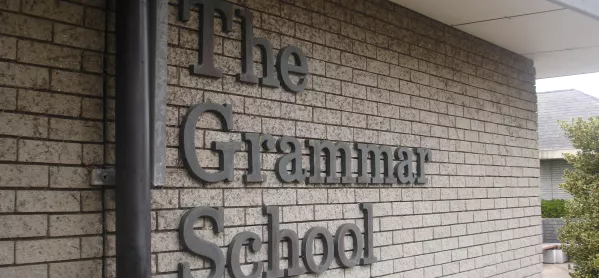- Home
- A teacher writes: ‘I failed the 11-plus. Here is my story’
A teacher writes: ‘I failed the 11-plus. Here is my story’

An embarrassing and painful memory
I failed the 11-plus. It is still an embarrassing, painful memory. My letter on results day was pink for the secondary “bilateral” school; my sisters and their friends had grammar-school white. I wore the wrong uniform and I didn’t do Latin or physics. In my first year at secondary school, I enjoyed illnesses because they were an escape. It was not until I saw myself sink to the bottom of the class that I knew I had to stop running away from the situation. I was lucky that this all happened before the target culture took hold - it would have added persecution to misery to be asked by my teacher why I wasn’t performing well.
Myths about best teaching
Looking back, I don’t feel I had a second-rate education. I learned self-discipline in an exceptionally well-ordered environment; teachers could be strict and approachable. The curriculum wasn’t noticeably watered down. We studied more than just the set books for English Literature (two Hardy novels, for example). Our teachers engaged us in debates. My sisters and their friends seemed to do a lot of note-making. Mine was the more holistic education.
Perhaps when we engage in a debate about the return of grammar schools we should not operate on false polarities. To postulate that all the best teachers would congregate in grammar schools is untrue and to assert that teachers in other school would therefore be second-rate is deeply insulting and demonstrably inaccurate. There is excellent teaching in secondary modern and bilateral schools and there is excellent teaching in grammar schools. The quality of teachers and teaching is more significant than structures.
The misplaced students in grammar schools
I joined the sixth form at the grammar school, expecting to be at the bottom of the class. Perversely, I was angry that I was not. There were grammar school students retaking O levels and a few additional O levels. They left after one year. Much is made of the advantages of a grammar school education - but what about those at the bottom of the intake? Perhaps these students would have fared better in a different school.
Was the selection on ability so infallible after all? My junior school sent just two girls and about seven boys to the grammar schools - there were reports that one school had sent nearly a whole form. At this point in time, I wonder how much coaching went on, in and out of school, to get such a large number in. By contrast, I learned a lot about my local environment as well as all the other subjects in Year 6. Educationally, I think my time was better spent, especially in the long run.
A significant number of grammar school students left at 16. Can it truly be said that these were the best students to select, the ones who would make the most of their opportunities? Perhaps I would have made more of a grammar school education, but that would have left me with less time for reading. It is very narrow-minded to assume that - even if we could accurately select on intelligence alone - such pupils would also have the right qualities to support them on an academic pathway.
The residue of failure
After a gap year, I went on to university. I suppose it could be said that I got there in the end. But the residue of the 11-plus experience lingers. At times my narrative can be one of triumph over adversity - at others annoyingly self-pitying. Sometimes I suffer from imposter syndrome and doubt can be corrosive. More objectively, I know that selection is not infallible. The values, discipline and engaging teaching remain with me from both environments. I was lucky.
Fairer financial and educational provision for all
The grammar school debate rages on, supported by those who benefited and stand to benefit most: the parents who will move house to get their children the best education they can in a “top comprehensive”, or take up a religion they had previously allowed to lapse to gain access for their children into a faith school, or embrace a new free school. In one way, the return of grammar schools makes choice of school more straightforward.
If the ambitions of the more academic are to be catered for, then even more attention and investment should be directed towards alternative, equally valuable provision for the majority. Will the government match the sum they are setting aside to enable schools to become more selective with money for those who can’t?
Because the selection procedures are not fair, there should be academic pathways in all schools. The academic-vocational divide needs to be bridged. In countries like Holland, there is greater parity of esteem, and vocational education genuinely leads to worthwhile careers. Britain is too narrowly focused on its managerial culture; vocational skills are the poor second cousin. I would much rather the education secretary concentrated on the more diverse 80 per cent of the population to achieve greater social justice and rewarding career paths for all in a more productive economy.
Yvonne Williams is a head of English who would like to thank all her teachers for their inspiration and understanding. The views expressed here are her own
Want to keep up with the latest education news and opinion? Follow TES on Twitter and like TES on Facebook
Keep reading for just £1 per month
You've reached your limit of free articles this month. Subscribe for £1 per month for three months and get:
- Unlimited access to all Tes magazine content
- Exclusive subscriber-only stories
- Award-winning email newsletters



